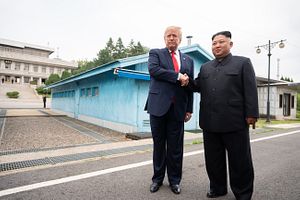By turning established diplomatic practice on its head and making an unscheduled stop to shake hands with Kim Jong Un in the DMZ, President Trump demonstrated his readiness to go the extra mile and beyond to meet the challenge his predecessor, Barack Obama, told him would define his presidency.
Rather than recognizing Trump’s determination to get negotiations back on track (since he left the Freedom House with Kim’s commitment to resume the working level talks), the press unfairly rushed to judgment.
The media frenzy started with an alleged New York Times’ “scoop” claiming that some senior members of the Trump administration were considering “a nuclear freeze that essentially enshrines the status quo and tacitly accepts the North as a nuclear power.” The press piled on, MSNBC calling such a freeze “a total failure of policy” and The Atlantic declaring Trump’s DMZ rendezvous “the day denuclearization dies.”
But what the Times and the Blob insist on misunderstanding is that such a freeze was never envisioned by anyone in the administration as an end in itself. Rather, it could be a significant step down the path denuclearization. In an interview before his trip, Trump himself stated: “It’s just a step. It might be an important step and it might not. But what we’re doing today is a step. And probably it’s a step in the right direction.”
On this point, Trump’s instincts are right. Even a perhaps embarrassed Times chose to print an op-ed recognizing such a freeze as part of the process, noting that any “deal would take place in three phases. North Korea would freeze production of nuclear weapons, roll back the bomb stockpile and nuclear program, and finally eliminate it.” Working with North Korea to stop their advance is a prerequisite to rolling it back, and the very process of doing so would help build a modicum of confidence that will be essential to further denuclearization.
The big truth that Trump’s critics refuse to acknowledge is that the Trump administration has already made Americans significantly safer by his first freeze-for-freeze. In that agreement, Kim froze further ICBM tests that would have given North Korea the ability to strike the American homeland with nuclear weapons, on the one hand, and Trump postponed further major joint military exercises on the Korean Peninsula, on the other. Assessed in terms of American national security, this is arguably the most significant achievement of American presidents in dealing with North Korea over the past quarter century.
North Korea has a nuclear arsenal now more than sufficient for its purposes in threatening us. Our objective is and must be to ultimately eliminate that as quickly as we can. But it’s also true that every additional nuclear bomb’s worth of material they produce adds another increment of danger for us. With so many potential nuclear bombs, how long can it be before a nation that is being starved economically and is known to sell whatever it has to whomever will pay, could become “Nukes-R-Us?”
When assessing Trump’s approach, we must ask two questions: what are American national interests and compared to what? In this case, the U.S. hierarchy of interests includes four items that matter more than no North Korean nuclear weapons, starting with: no nuclear explosions on American soil, no North Korean capability to attack the U.S. with nuclear weapons, no second Korean War (that could drag the U.S. and China into war), and no sale of nuclear weapons.
Without the undoubtedly unorthodox, sometimes seemingly bizarre policies and actions of the Trump administration, where would we be today? When this administration began, North Korea stood on the threshold of a reliable capability to deliver nuclear warheads against the American homeland. Since then, North Korea has stopped all ICBM and nuclear tests – and thus not acquired a reliable capability to strike the U.S. – and has pledged to denuclearize.
Whether the Trump administration can now persuade Kim to embrace a Big Freeze-for-Freeze in which North Korea halts production of fissile material (in a verifiable way, which will mean acknowledging their secret production facilities) in exchange for the U.S. forgoing additional sanctions and letting South Korea provide more humanitarian relief remains to be seen.
If it can, and if this proves to be a milestone on the road to complete denuclearization of North Korea, some time in this future, President Trump could indeed find himself in Oslo receiving a Nobel Peace Prize.
Graham T. Allison is the Douglas Dillon Professor of Government at Harvard Kennedy School and the author of Destined for War: Can America and China Escape Thucydides’s Trap?.
































